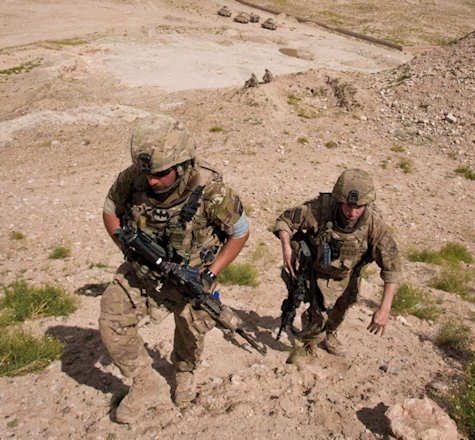|
PARWAN PROVINCE, Afghanistan (6/10/2012) – In Afghanistan,
U.S. Air Force and Army uniforms are hard to distinguish
between. Both have the same “multicam” pattern and
tailoring. In fact, if the ranks and names weren't a subdued
crimson on the Air Force uniforms instead of the Army's ink
black it would be nearly impossible to tell them apart.

U.S. Air Force Senior Airman Edgar Cerrillo from Covina, Calif.,
an advanced designated marksman for the 455th Air Expeditionary
Wing, Task Force Reaper, and Senior Airman Sean Stacey, a gunner,
climb a mountain above an old Russian fighting position the unit was
inspecting near Bagram Air Field, June 6, 2012. The unit is tasked
with securing a 10-mile radius around the airfield for aircraft to
safely take off and land. Photo by USAF Sgt. Ken Scar
|
|
Of course, due the friendly rivalry between the two branches, airmen
and soldiers are hard pressed to admit they share anything in
common. The airmen of the 455th Air Expeditionary Wing, Task Force
Reaper, on the other hand, take the contrasts between an Air Force
unit and an Army infantry platoon and erase them completely.
The 455th secures all areas within a roughly ten-mile radius
around Bagram Air Field, making it safe for aircraft to take off and
land. It is a big job, as Bagram Air Field is one of the largest
U.S. military bases in Afghanistan, its dual runways host scores of
takeoffs and landings every day. Approaching aircraft have to fly
low over villages and farmlands that lie just outside the walls,
making them prime targets.
The insurgents around the airfield
have proven to be headstrong and tenacious. They set up rudimentary
timed rocket attacks, plant mines, sneak anti-aircraft weapons
between settlements, and repeatedly attempt to tunnel under the
barriers, to name just a few of their tricks.
“Our mission
is providing security for the base security zone,” said U.S. Air
Force Tech. Sgt. Dale Spencer, a squad leader for the 455th who
hails from Tucson, Ariz. “We do everything from counter-tunnelling,
counterinsurgency, small-arms fire and indirect fire responses to
point of origin sites ... anything that needs to be done within that
ring.” |
“Anything” also includes acting as a quick reaction force to
rocket attacks, conducting shuras, clearing villages, and
setting up traffic checkpoints.
The unit conducts
mounted and dismounted patrols daily into the deceptively
kinetic lands and villages around the airfield, exactly like
an infantry platoon might.
“A lot of our training is
based off some of the Army manuals,” explained Spencer. “We
take those tools and apply them to providing security for
the airfields. It makes it so we can go out with an Army
unit, blend in, and seamlessly accomplish missions.”
“I love it,” said Covina, Calif., native, U.S. Air Force
Senior Airman Edgar Cerrillo, an advanced designated
marksman for the unit. “I love the mission. Any time
something happens near [Bagram], we're the ones that go out.
We make sure the aircraft are able to take off and land
safely, and we try to find the guys that shoot at us.”
“What I love about our team is we do a little bit of
everything,” said U.S. Air Force Staff Sgt. Cecy Hunter, a
truck commander from New York, N.Y. “We're very versatile.”
One day spent with the unit reinforces Hunter's claim.
The day begins with a foot patrol through a small
village, interacting with the locals and searching for
possible anti-aircraft weapons that have been reported in
the vicinity. Afterwards the unit conducts a meeting with
local elders, followed by an evidence-gathering trip to a
desolate point-of-origin site where a rocket was fired
against the base the day before. They then mount their mine
resistant ambush protected vehicles and convoy for 45
minutes to the mouth of the Panjshir river valley, where
they set up a traffic check point, searching vehicles and
questioning travelers for several hours.
During the TCP their sniper team discovers a man-made cave
on a steep mountainside next to an old Russian fighting
position, so an element climbs the hillside to inspect the
cave to make sure no weapons caches or other threats are
hidden inside. They finally pull back onto Bagram Air Field
as dusk is settling over the valley.
Without spotting
the reddish name tapes, anybody would think this was a
high-speed Army infantry platoon.
“Everybody should
know how hard these airmen work,” said Spencer. “They are on
call 24/7, seven days a week, 365 days a year. Sometimes
they go a month and a half on end with no days off, with
limited amounts of sleep, limited amounts of eating and at a
very high tempo.”
That high operation tempo seemed to
have paid off in quieter skies around the base, with rocket
attacks coming less frequently than in the past.
“For
a spring offensive to be happening, and going three weeks
plus without [indirect fire] – that's kind of unheard of,”
said U.S. Air Force Master Sgt. Kenneth Broughman, the
non-commissioned officer in charge of the Task Force Reaper
quick reaction team section. “There's other pieces to the
puzzle involved, but there's not a doubt in my mind these
guys play a big role in it.”
“These guys are so
dedicated,” said Spencer. “It doesn't matter what the
mission is or how far they have to walk, if they miss a meal
or a couple hours of sleep, or miss talking to their family
– they're out there watching our backs no matter what.”
”When he says they miss meals, that's an
understatement,” said Broughman. “They miss meals every day.
Yet there is no complaining. They do everything that's asked
of them and then ask what else they can do.”
That's
enough to earn anyone's respect, no matter what color the
rank is on their uniform.
More photos available in frame below
By USAF Sgt. Ken Scar
Provided
through DVIDS
Copyright 2012
Comment on this article
|



